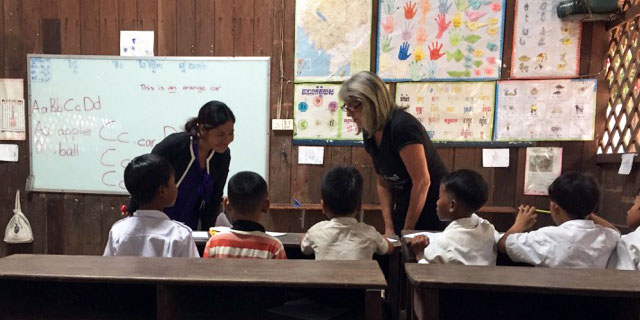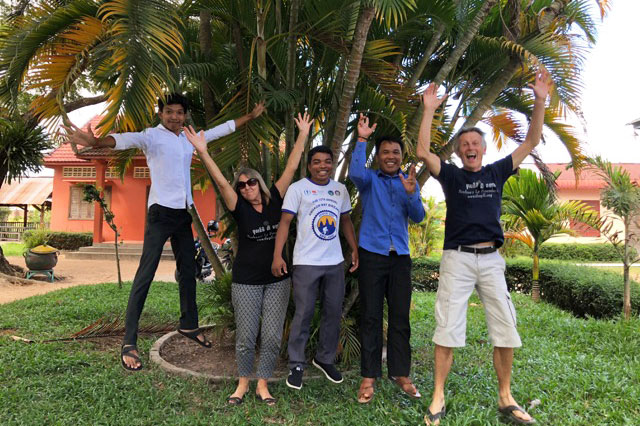Di and David have been volunteering with PLF since 2012, working with our English teachers to develop their skills in and out of the classroom. Read more about their most recent volunteering trip to kick off the 2018-2019 school year!
“Once again we have had the privilege of running workshops to help improve the capacity of the PLF English teachers at Chey and Knar Schools. When we started our journey in 2012 we met a number of extremely enthusiastic Teachers who were struggling to make sense of what it means to be a teacher and trying to work out how to help their students learn to speak, read and write that complicated language we call English. Their enthusiasm was unmistakeable, but so too was their need to learn what it means to develop learning in their students. Add to this the challenge of the conditions that they were teaching in: hot, basic classrooms with almost non-existent teaching materials, black and white photocopied books and literally nowhere to leave whatever teaching resources they managed to gather. They were asked to deliver a very complicated curriculum which demands a reasonably sophisticated understanding of lesson structure, pedagogy and learning theory. Under-pinning all this was a need to be able to actually speak fluently in the language being taught, something that a few were struggling with themselves.
As a teacher trainer herself, Ponheary Ly, founder of the PLF, had been attempting to provide guidance to the English teachers to help them to move away from the rote learning model that they had experienced as students themselves. She demonstrated that learning could be fun, and that students will learn best when they are involved in activities and games that amuse and excite their interest.
Like Ponheary, we had also found that the teachers resort to the inactive model of learning that they had experienced themselves. English words were written on the blackboard and students were expected to copy them down and repeat them back, often in unison as a whole class. Some got it, but of course many didn’t. Some enjoyed it, many were bored and switched off.
We have spent time role-modelling a more student-centred way, introducing methods of engaging the students through active games and involvement. We have demonstrated a number of different instructional strategies that ensure that students are active during lessons, where learning is deliberate but incidental to the actual activity. Students began to laugh and have fun. So too did the teachers who realised that a noisy classroom is not such a bad thing. Soon the teachers were developing their own games, exercises and activities that worked for them and enhanced their student’s learning. It has been so great to see and experience.

Di works with PLF teacher Chenda to model an in-class activity
At the same time as the teachers’ confidence with this alternative way of developing learning in the classroom grew and became second-nature, it was obvious to us that they were still struggling with the content of their lessons. They were unsure about a number of things: just what do we need to teach, when and for how long; should we focus on new words, or grammar, or both? Yes, they did have access to one of the world’s most developed English as a second language instructional system, but its complexity was challenging even the best amongst them. The Teachers Manual was so comprehensive that it was almost over-whelming. Hence our attention turned to the question of how this system could be made more understandable, whilst retaining the highly desirable integrity that is displayed in its construction and design over its seven levels. While seemingly complex, the Let’s Go program is conceived as a series of lessons that firstly introduce new words, then use those words in simple descriptive sentences, followed by a number of question-and-answer patterns based on those words to encourage conversation, and finally exercises that utilise the same words to help students read and write. These four components are repeated for each topic where new words and language are introduced. The teachers appeared to grasp the essence of the program and began to feel very comfortable with their understanding of the curriculum.
Our input has been enhanced by another PLF Volunteer Teacher Trainer who has built upon the basic structure and developed a number of resources that are now readily available for teachers. We are all now in the process of refining some of the pedagogical and classroom management skills of the teachers. The focus of our workshops this year was to look at classroom management strategies, basically how a teacher can manage a classroom to ensure that all students are engaged and learning. We have also started to address the challenge of consistency between teachers and schools. The best example of this is the need for appropriate testing that is valid and consistent so that the PLF can get a genuine handle on how well the program is going. One aspect of this is the challenge of utilising rubrics to ensure that oral assessments are undertaken reliably by all teachers, something that is not easy to achieve.
We have enjoyed working with Chenda and Kaoun at Knar School and Sil, Sokvann and Sothy at Chey School. They are all such inspiring teachers who are developing skills and capabilities that will eventually place them amongst the best in Cambodia. We leave Siem Reap feeling honoured that we have been to be able to work with these amazing people.”

Di, David, and the Chey English teacher team celebrate a successful workshop series

Recent Comments